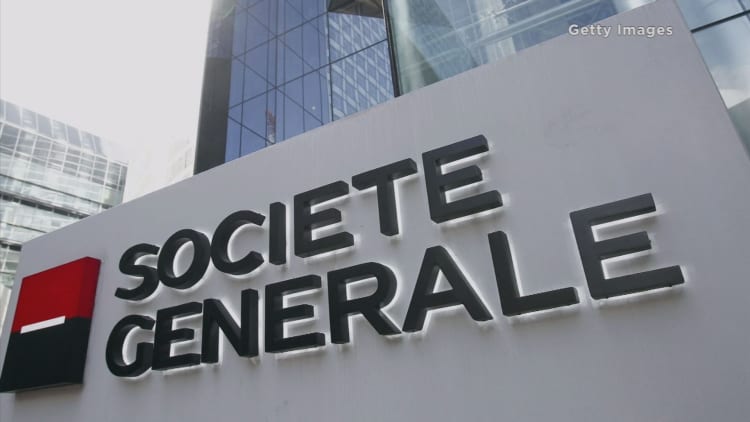
Risks to the world economy remain to the downside and include sharply weaker global growth and a sudden change to expectations regarding the U.S. Federal Reserve's interest rate path, Societe Generale warned on Tuesday.
The French bank also said there was still a 30 percent chance of an economic "hard landing" for China, in its quarterly economic outlook.
Societe Generale's swan chart of risks
Societe Generale Cross Asset Research/Economics
"The potential for policy errors in China is substantial, and all the more so since a new bubble appears to be building in the property market," Societe Generale analysts, led by Patrick Legland and Michala Marcussen, said in the report.
"The authorities are clearly keen to start recognizing and tackling the mountain of non-performing loans. The approach will be one of trial and error, with the downside risks implied in the name."
A sharper-than-expected deceleration in the world's second-largest economy could reverberate around the world. SocGen termed it a "black swan" — a metaphor for surprise events that severely affect the world.
The bank forecasts China's economy will grow by 6.5 percent in this year, in line with consensus estimates.
Top economic risks—and how likely they are:
- Double-drag from European policy uncertainty: 40%
- China hard landing: 30%
- Sharp re-pricing of Fed expectations: 25%
- Sharply weaker global growth: 20%
SocGen said uncertainty about Europe's political direction was another risk to the world economy. The near-election of a far-right president in Austria this month and the U.K.'s upcoming referendum on leaving the European Union have brought politics in the region into sharper relief.
The bank said there was a 40 percent risk that an unexpected political turn in Europe could double the drag from policy uncertainty on economic growth.
"With a very busy political agenda lined up for the coming quarters, the risk of an event delivering an unexpected outcome remains high, be it the OMT (outright monetary transactions) judgment from the German Constitutional Court on June 21, the U.K. 'Brexit' referendum on June 23, Spanish election on June 26, Italian referendum in October and heading into 2017, elections in France, Germany, Netherlands and possibly Italy," the bank said.
SocGen sees growth in the 19 euro zone countries averaging 1.6 percent in 2016, in line with consensus estimates.
It added that another "black swan" for the economy could be a disorderly re-pricing of market expectations of when the Fed will raise rates again.
Markets are mulling whether the Fed will raise rates in June or July, but SocGen thinks the next hike will not occur until December. It forecasts the central bank will then raise rates by 25 percentage points three times in 2017.
"If the Fed sends too hawkish a message, the risk is that the re-pricing could turn disorderly. On the flip side, too dovish a Fed could see bond markets unnerved by higher inflation readings and an ever tighter labor market," SocGen said.
The French bank sees ongoing policy divergence between the Fed and other major central banks, with the Bank of Japan seen continuing on its current policy path and the European Central Bank expected to taper quantitative easing between March and December 2017.
SocGen added that it had "given up" on the Bank of England raising rates from the record-low of 0.5 percent and that the U.K. central bank's next move would be a cut in 2019.
The French bank added that the risk of a global recession had eased, but that a sharp disappointment to global growth would still pose a major risk to the global economy.
"A prolonged negative market response is the most likely mechanism to take a slowdown to outright recession," it warned.
Follow CNBC International on Twitter and Facebook.




